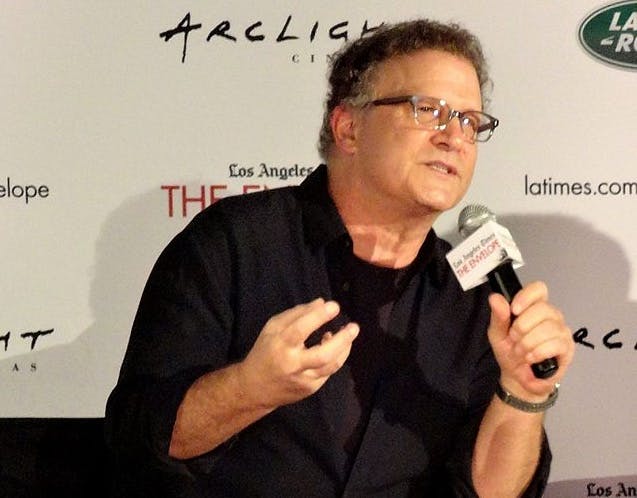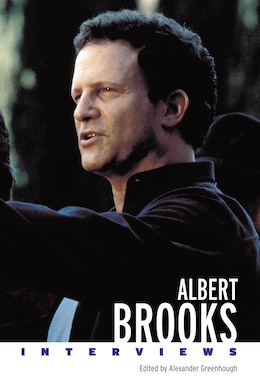Is Albert Brooks ‘the Funniest White Man in America’?
That’s one of many labels for the comedian, filmmaker, and author found in ‘Albert Brooks: Interviews,’ a compilation of interviews dating between 1979 and 2018, roughly corresponding with his career as a filmmaker.

“Sitting home, being scared all the time, watching the terror warnings, and being told we’re living in a new world. I began to think, ‘Well, how do I function in this new world? What do I do?’” This is a question many Americans asked themselves in the days, months and years following 9/11. In this case, we’re hearing it from a comedian, filmmaker, and author, Albert Brooks, during a 2006 interview with Terry Gross on the NPR program “Fresh Air.”
That conversation is one of 13 published in “Albert Brooks: Interviews,” a compilation edited by a teacher in the writing and rhetoric program at Stanford University, Alexander Greenhough. Culling interviews dating between 1979 and 2018, a time-frame that roughly corresponds with Mr. Brooks’s career as a filmmaker, Mr. Greenhough hopes that these essays shed light on the “dark ridiculousness” of “the funniest white man in America.”
This dubiously stated badge of honor comes courtesy of Paul Slansky, who authored two of the interviews. Like many books of this stripe, “Albert Brooks: Interviews” suffers from repetitiousness: Facts and stories are passed on, from this profile in the Village Voice to that essay in the New Yorker and back again. The best of these anecdotes begs credulity: Did Mr. Brooks’s father, the dialect comedian Harry Einstein, really name his son Albert as a too-obvious-be-avoided joke?
Mr. Brooks has made an odd job of it as an entertainer. He’s a talent with a cult-like following who has been a steady presence in mainstream showbiz. Back in the day, Mr. Brooks would set Johnny Carson into hysterics on “The Tonight Show,” but he was also a natural in the earliest episodes of “Saturday Night Live.” Since then, he’s crafted a handful of niche films, all the while having been an integral component of high-profile entertainments such as “Broadcast News,” “The Simpsons,” and “Finding Nemo.”

“Looking for Comedy in the Muslim World” (2005) was a quixotic response to 9/11. In it, Mr. Brooks plays a thinly veiled version of himself who is sent overseas by the American government on a mission to find out what it is that makes Muslims laugh. With his character traveling to India and later sneaking into Pakistan, Mr. Brooks has occasion to engage in gags that are both obvious (White House phone operators in Delhi) and barbed (the prevalence of antisemitism).
Critics and audiences were tepid about the picture upon its release, but I wonder if moviegoers were still too skittish to let themselves laugh at Mr. Brooks’s sly assault on cultural presumptions, political grandstanding, and a New World Not-So-Ordered.
Some folks found it funny. In an interview with Scott Tobias, originally posted at the A.V. Club and published in this book, Mr. Brooks talked about how “Looking for Comedy in the Muslim World” was received by the crowds at its premiere at the Dubai International Film Festival. It was, he relates, “the greatest comedy experience I’ve ever had, bar none … the audience was getting things that Chicago, New York audiences don’t even get.”
Not that this salutary experience went far in explaining every last joke, particularly when a throwaway line about Abbott and Costello got one of the biggest laughs. But, then, Mr. Brooks avers, “I enjoy making three people laugh as much as I enjoy making [three million] people laugh.” This attitude doesn’t get one far in a cultural milieu that tends to favor big numbers over good films. There are a number of reasons Mr. Brooks’s output is small; this is one of them.
Another reason is that Mr. Brooks is “almost too smart for his own good,” as his co-star in “Modern Romance” (1981), Kathryn Harrold, had it. As a filmmaker and comedian he’s never coddled audiences: “You have to take risks and not be afraid to disturb people.”
How much of a risk was “Finding Comedy in the Muslim World”? The real Mr. Brooks hasn’t made a film since; the cinematic Mr. Brooks ended his fictional U.S. mission by starting World War III. “Albert Brooks: Interviews” goes some way in elaborating why its subject is “funnier than we think” and a “problem child.” Oh, and “Mr. Nice Guy, he is not.”

